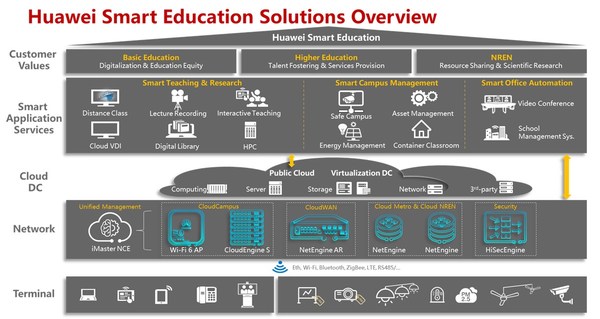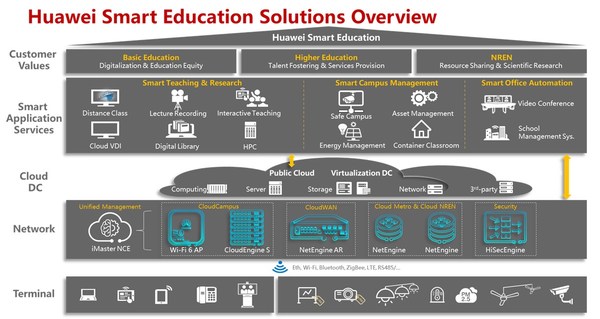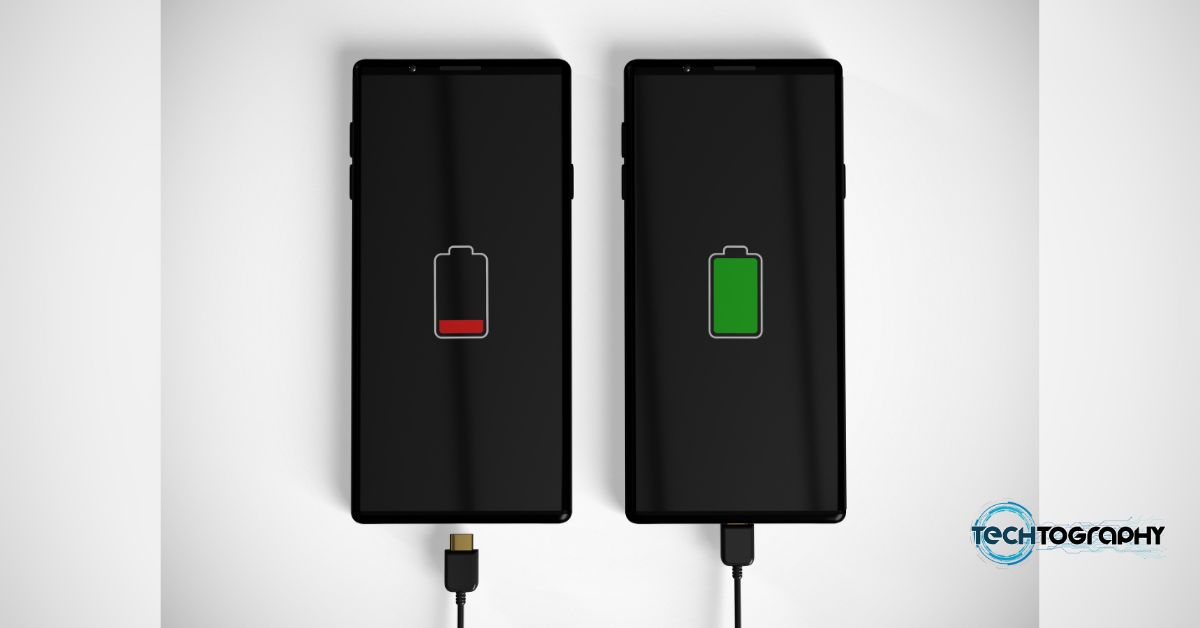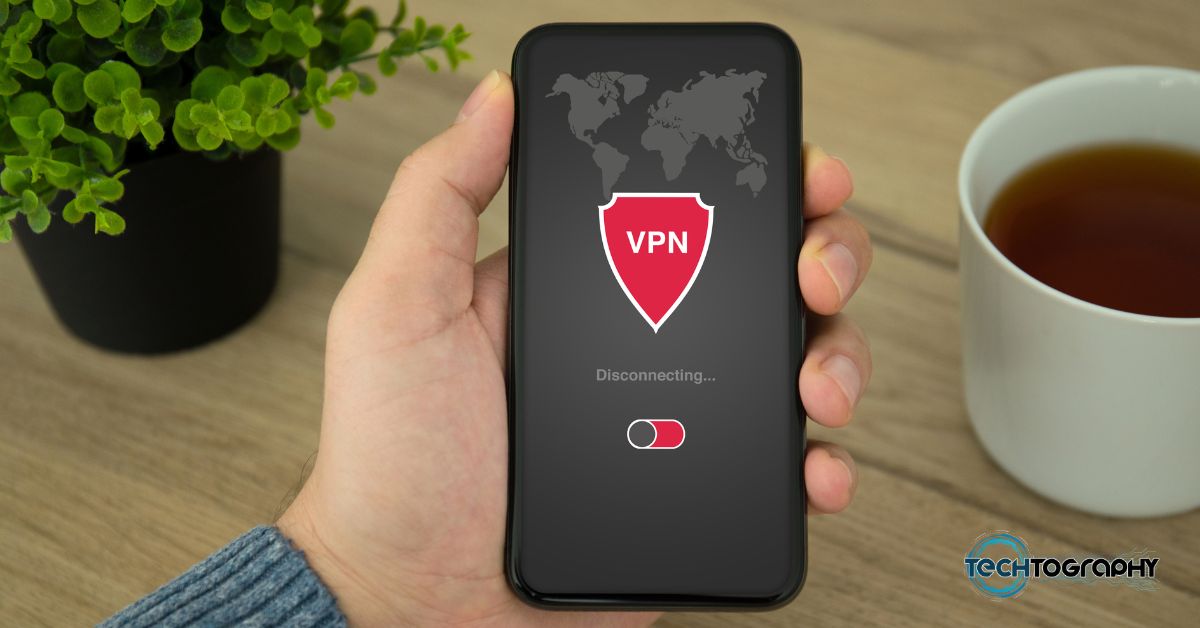SINGAPORE, June 9, 2021 /PRNewswire/ — Themed "Embracing the New Era of Intelligent Education", Huawei recently held the Asia-Pacific Higher Education Innovation Forum through live streaming. The forum invited renowned industry experts from UNESCO ICHEI, NUS, Open University, Thammasat University, National University of Malaysia, and PwC, including 450 informatization directors, partners, and business luminaries. Together they focused on topics such as smart campus, online education, and smart classroom, and discussed the development trend of education ICT and the challenges and opportunities for education informatization in the post-pandemic era.
In recent years, universities in the Asia-Pacific region have been developing rapidly, and their world university rankings continue to increase. ICT applications are playing an increasingly important role in the teaching and management of these universities. At the opening ceremony, Nicholas Ma, President of Huawei Asia Pacific Enterprise Business Group, shared Huawei’s understanding of ICT development in higher education in the Asia-Pacific region, as well as its vision of smart higher education in the future. Huawei has served more than 300 colleges and universities within the Asia-Pacific area with its education ICT solutions, and has built ICT academies for 224 schools and trained over 10,000 students. Huawei has also developed more than 4300 ICT professionals for various countries, and will continue to serve customers in the education industry and cultivate more high-quality, innovative talent through the Asia-Pacific region.
Professor Zhao Jianhua, Senior Specialist of UNESCO ICHEI, shared his insights on the exciting new trends in education. According to Prof. Zhao, today’s education industry is being shaped by five major digital technologies: AR, personalized hybrid learning, gamification, AI, and IoT. What’s more, there will be five new applications in the education industry: a more efficient learning system, mental health monitoring, personalized distant education, automated data processing, and personalized collaborative education. Online education is disrupting the industry with its flexibility, easy accessibility, and student personalization. In addition, e-Learning is slowly becoming a common teaching method of online education due to the impact of COVID-19.
The recent disruptions to the world in the last 18 months have severely affected university education around the world. Many teachers and students can no longer go to school like they used to. During the panel session of this forum, the panelists expressed how universities in the Asia-Pacific region use ICT to offset this impact, what plans and visions they have for future teaching and management models, and how to accelerate the digital transformation of universities. Each panelist showed their idea as below: Prof. Andrew Zhao (Senior Specialist of ICHEI (UNESCO), Deputy Director, Center for Higher Education Research, Southern University of Science and Technology) mentioned that ICHEI recently launched an international platform for higher education teachers, which is named as International Institute for Online Education (IIOE). One of the goals of IIOE is to enhance ICT capacity of higher education teachers to adapt to the digitalized education transformation. Assoc. Prof. Erle Lim (Vice Provost (Teaching Innovation & Quality) National University of Singapore) reminded that technology will allow us to develop a useful computerized adaptive teaching and learning (and recommender) system, to assess how students are learning, acquiring skillsets and achieving competencies. Technology is merely an enabler, however – the human element is very important. If the teachers do not properly assign a value (degree of difficulty, which knowledge units and skillsets) to the assessments, if the students and teachers do not avail themselves of the functions, the best system will not be useful. On the primary challenges faced by universities and higher learning institutes, Assoc. Prof. Jirapon Sunkpho (Vice Rector of IT, Thammasat University) reiterated that ensuring students with proper devices and Internet connection is the first task to innovation in online learning. Rules and regulations in some countries still pose a challenge in acquiring some cutting-edge technology. In the topic of assessment and examination, Prof Ricky (Vice-President (Students and Support), The Open University of Hong Kong) commented that examination is considered an old tool in today’s context. Convenient as it may seem, examinations might not be the single best tool today as there are so many different modalities and areas which data information can be obtained as a form of assessment. On the comments for key success factors on digital transformation in higher education, Joseph Ho (Director, PwC Strategy&) commented that it is important to know how to use the existing setup today and integrate more technology into online engagement and maintaining engagement in order to do much more than just teaching. The key is maintaining the communication alive and keeping students engaged. On the same note, Assoc. Professor Dr. Nurhizam Safie (Deputy Dean (Networking & Alumni), IST Faculty Universiti Kebangsaan Malaysia) stressed that the critical success factor for digital transformation in higher education is to embrace the new online pedagogy and it’s really about effective change management and managing the transition to online learning.
Currently, many universities are facing similar problems, such as a lack of teacher-student-classroom interaction, the insufficient sharing of education resources, difficult management due to scattered school services, high energy consumption, and low decision-making efficiency. Therefore, it has become a priority for education administrators and teachers to tackle such challenges. At this forum, Shi Ri, Huawei APAC, introduced the Huawei Smart Campus Solution and Smart Classroom Solution designed for higher education. Huawei is collaborating with industry-leading partners and is leveraging its cloud platform to provide E2E smart education solutions that cover smart devices, converged networks, and teaching and management applications for university customers in multiple countries, including South Africa, Italy, and UAE. Through technological innovation, Huawei is helping to implement a student-centric OMO hybrid learning mode, and is continuously optimizing the teaching environment, teaching efficiency, teaching quality, and campus management efficiency.
Last but not least, Dr. Teo Tee Hui, Vice President of The Institution of Engineers, Singapore and Senior Lecturer at Singapore University of Technology and Design (SUTD), introduced the cooperation projects between SUTD and HUAWEI CLOUD. Particularly, he emphasized the Smart Hybrid Learning Solution, which includes modules like cloud-based learning management system, smart hybrid lesson, online exam, AI proctoring, virtual computer laboratory, and VDI, and uses Huawei IdeaHub to implement online and offline interactive teaching.
Higher education is the basis for a country to cultivate innovative talent, industrialize research achievements, and transform the economy. As a world-leading ICT solution provider, Huawei will never cease to innovate and provide simplified, secure, open, and intelligent products and solutions for the education industry in Asia Pacific and even around the world, facilitating the digital transformation of learning and education.




